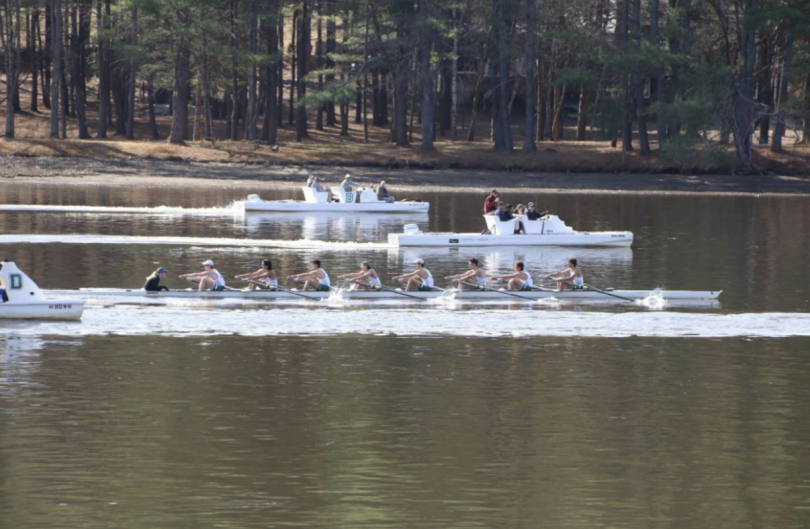
Q&A with Lightweight Rowing Coach Trevor
1. What initially drew you to Dartmouth when you first joined the coaching staff?
Dartmouth to me is a school that really prioritized the liberal arts education, which encompasses small class sizes, a great professor to student ratio, and a path to really study what you want to study. There's no question that Dartmouth is one of the best academic institutions on the planet. Within the top tier of academic institutions, it's really unique amongst its peers because we are the smallest Ivy League institution and we're rural, which bonds our community together. Anytime you have a unique place, it's going to be pretty easy to attract kids there.
2. What's your favorite part about being the head coach of the Men's Lightweight rowing team?
The guys; I just love my team. I've known them all for a long time. I think that I really pride myself on the relationship I have with my guys and being able to use that relationship to push them to their best possible result. To me, I see coaching as developing them as rowers, and through that pursuit of excellence, developing them as people. That draws me to coaching in general, but specifically at Dartmouth. I think I just have the best group of guys in the country. I love every minute of spending time with them and helping them all strive together to be the best they can be.
3. Being a D1 athlete and an Ivy League student definitely isn't easy. What support is in place for your athletes to succeed on and off the water?
Dartmouth has fantastic academic services. Stacy Bridges with Dartmouth Peak Performance does a great job to help keep athletes on track in terms of their majors and make sure they don't forget deadlines. I also try to help our athletes; I try to keep the pressure low at the boathouse because these kids are self driven. They put a lot of pressure on themselves to succeed in the classroom, to succeed on the water, to succeed in their careers, and I want to make the boathouse a place where we can check a lot of that stuff at the door and just focus on this one thing and have fun doing it. I think it is really important to really try to prioritize sleep, so I really try my best to set up the practice schedule in a way that helps the athletes get as much sleep as they can.
The best part of being on a team is having access to upper-level students. I think our upper-level students help our first-year students navigate college and navigate being part of a competitive collegiate athletics program, and that's really important to lean on the people around you. I'm a resource they can lean on, but their fellow teammates are as well.
Academics and athletics are really important to our team. I would say it's not one that's prioritized over the other. It's this sliding scale where there are times a year where academics have to take precedence over athletics, and then there'll be times a year with athletics having to take precedence over academics, but academics are always at the forefront of our minds. The more I can do as a coach to support the rowers where they can be successful on and off the water, the better they're going to be at both.
4. What would you say to any high school juniors and seniors considering an athletic career at Dartmouth?
What you'll find at Dartmouth is top-tier academics and top-tier athletics in terms of facilities, coaches, and a community here that's unrivaled by many. And the statistic that Dartmouth is always on top out there, year in and year out. And that's the grateful grad stat and grateful grad; I don't know how they get the formula, but basically, it's alumni that come back to campus and give back to campus, right? And Dartmouth is always number one, and I think that's what we talked about earlier: that tight-knit community and that rural feel that brings our squad and our campus together. And I think that's what really stands out as unique.
At Dartmouth, you have a community that's not only going to carry you through your four years but really carry you through the rest of your life. I think you'd be hard-pressed to find another academic institution that has a stronger and more passionate support system in terms of its alumni base than we do.
5. What has been your favorite memory while at Dartmouth?
It's not one particular memory; we've had some really awesome results, and I could pick that. My fondest memories at Dartmouth are those long, hard Saturday morning practices in the fall with beautiful water, 15 or 20 kilometers away from the boathouse, and just getting ready to watch the guys tear it up.

6. You grew up in New York City, and many prospective students are from major cities. How do you feel about Hanover's small-town feel?
I grew up in New York City and spent my whole life there. Trying something new and being somewhere different was such a unique and rare opportunity. I think so many kids are drawn to cities after they graduate because of the availability of jobs. So, being away from that and really enjoying your time in nature and in this Dartmouth community is just special. It's not for everyone; I would never say it is. But if you're open to going somewhere a little different, I think most kids would really surprise themselves with how much they love it.

















